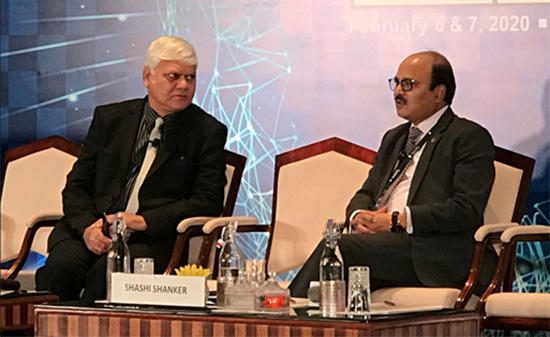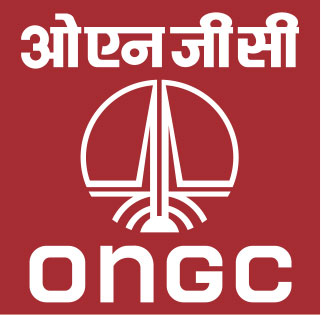Speaking at the 8th World Energy Policy Summit (WEPS) on 6 February 2020 at New Delhi, CMD Mr Shashi Shanker said that there will be substantial disruption in energy industry in the near future. “Going forward, ONGC will be a very exciting place to be in, as it will expand manifold in operations.” The ONGC CMD was in conversation with the Chairman of Independent Energy Policy Institute Mr Narendra Taneja at the summit, which was attended to by the Who’s Who of Global Energy Industry. WEPS is an annual international conference to encourage discussion, debate and direction for the energy industry.

CMD Shashi Shanker (Right) interacting with Narendra Taneja (Left) at 8th World Energy Policy Summit in New Delhi
Responding to a query on ONGC’s future in the next 10-15 years, Mr Shanker said, “We have drawn up an Energy Strategy 2040 with the future in mind. We envision ONGC to be expanding its position all across the value chain, while retaining focus on Oil & Gas.” He said that the percentage of renewables in ONGC energy portfolio will increase.
Mr. Taneja wanted to know ONGC positioning in the changing energy landscape in India, especially in the E&P segment. CMD stated that the deep-water (DW) campaign, spearheaded by him, started in 2003. ONGC drilled over 100 Wells in Deep and ultra-deep water (UDW), making some key discoveries and is developing DW part Cluster II and UDW Well 98/2.
Mr Shanker said that the country’s energy future lies in the less explored areas including deep water. “The Indian sedimentary Basins are huge and we have explored little less than half of it as data were not available. The resource base has been re-assessed and ONGC and OIL have done the 2D survey. Now, we will soon have a couple of more producing Basins – starting with Kutch. A lot of exploration activity is on,” he said.
During the interaction, Mr Narendra Taneja noted that according to Organization of the Petroleum Exporting Countries (OPEC), the demand of energy in the country will double. He asked for the CMD’s views on how India will maintain its domestic supply and how ONGC is prepared to double its production to meet the growing need.
Mentioning that there have been no big ticket discoveries recently, CMD Mr Shanker said, “Realistically, domestic supply of liquid fuels will not be able to meet the expectations. However, Natural Gas production will increase in India. The growth in gas production in ONGC has been around five percent per annum for the last four years and the future will witness a higher rate of growth. One project in the east coast would alone boost production in a big way.”
Referring to a query if the Chinese model of having large overseas energy assets could be adopted in India, Mr Shanker said, “Yes, India is already on that path. As per statistics, ONGC Videsh Limited is now the 2nd largest Oil and gas player in India after its parent ONGC.
Mr Narendra Taneja asked the ONGC CMD the energy companies (other than ONGC) he admires. Mr. Shanker said that among National Oil Companies (NOCs), the working of Petronas and Equinor are admirable. He said that companies have their own strengths on their own turfs, so identifying individual companies would not be fair.
Talking of work life balance, Mr. Taneja asked how are CEOs of big energy organizations like ONGC looked upon beyond the organization boundaries, especially given that fossil fuel companies are looked upon as polluting elements.
CMD said that for communication is vital to make all stakeholders appreciate the importance of energy, and in that energy portfolio, the continuing importance of fossil fuels. “Energy is vital for economic growth.” ONGC sustainability is a dominant issue and all stakeholders will appreciate the fact. “ONGC is reducing its carbon footprint. ONGC is one of the first PSUs to undertake a number of Clean Development Mechanism (CDM) projects like ONGC Tripura Power Corporation, earning substantive CERs. So, we are proactive in sustainability and in Energy Strategy 2040, ONGC will have a significant presence in renewables.”
Responding to Mr. Taneja’s query if the leadership growth for Energy Strategy 2040 will be met in-house, CMD mentioned that ONGC has a culture of grooming professionals in-house. “ONGC is now certified as a ‘Great Place to Work’ by an US agency”. He said, “ONGC has a culture of home-grown leaders and in our journey to Strategy 2040, I believe leaders will be from ONGC itself.”
The theme of the conference at the eighth World Energy Policy Summit on 6 February 2020 was ‘Energy: New Fundamentals, New Opportunities’. The conference was graced by Minister of Commerce and Railways Mr Piyush Goyal, former President and CEO of Saudi Aramco Mr Abdullah S Jum’ah, CEO of Rystad Energy Norway Mr Jarand Rystad, CEO of Nayara Energy Limited Mr B Anand, CEO and Director (Projects) GAIL (India) Ltd Mr Ashutosh Karnatak, Lead Country Manager South Asia ExxonMobil Gas (India) Pvt Ltd Mr William P Davis, Regional President and Head of Country, BP Group Mr Sashi Mukundan and CMD of NTPC Limited Mr Gurdeep Sing.
Speaking on the occasion, Minister Mr Piyush Goyal stressed on the need to devise new technologies for continuity in renewables. He noted that fossil fuel supple the base load and hence will remain a significant player in the future, over which renewables will develop with the advent of technologies. “So, we need to continue to invest in fossil fuel based projects, unlike the approach of European financial institutions who have stopped funding fossil fuel projects,”
Saudi Aramco CEO Mr Abdullah S Jum’ah said that the pace of development in India never ceases to amaze and is visible even for the frequent travellers. He said that though the Kingdom of Saudi Arabia is seen by many commentators as ‘conservative’ and ‘adverse to change’, the country now has a modern government and key economic indicators are better than world average.

